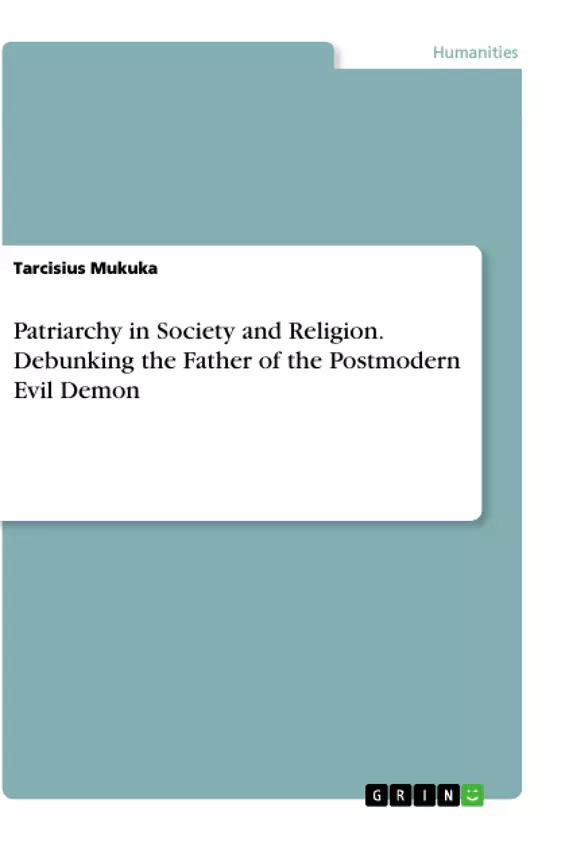This article seeks “to expose the falseness or hollowness” of a millennia-old ideology. I intend to critique what I have described, with a modicum of poetic licence, as the father of the postmodern evil Demon known as patriarchy by turning on its head, an op-ed by Cardinal Wilfrid Napier entitled “Patriarchy is not the source of all evil” which got my scribal juices flowing. I explore the origins of patriarchy going back to about four millennia ago in Mesopotamia in the Ancient Near East and show that patriarchy in both religion and society is the source of the post-modern evils of domination, colonisation, and othering others, suppressing and dehumanising them, especially if these others are women, simply because men can pee while standing. This has been the case since at least four millennia ago if not earlier. Patriarchy is not limited to domination of women. In fact, it began at the time of the shift from homo sapiens being hunter-gatherers to sedentary agriculturalists when gender roles begun to be defined. Men specialised in bringing home the bacon as warriors and bread winners while women focused on child rearing. Patriarchy is now so steeped in religion and society that men are unlikely to relinquish it any time soon because it is in the interests of the menfolk to perpetuate it. Soon after the elf-like President Frederick Chiluba came into power in a landslide election win in 1991, he was heard to remark to close aides, one of whom I know, “Power is sweet.” I have employed two lenses to examine the evil of patriarchy: critical theory and ideology. I take cognizance of the phenomenon of patriarchy being so pernicious and widely accepted, even revered ideology that it needs to be critiqued and debunked.
Table of Contents
- Introduction
- And so, where do I start apropos the evil Demon patriarchy?
- Enters a Cardinal's Anti-Patriarchy Rant
- Meet the Father of the Postmodern Evil Demon: What's Patriarchy?
Objectives and Key Themes
This article aims to debunk the ideology of patriarchy, exposing its falseness and hollowness. The author critiques the origins of patriarchy, tracing it back to the shift from hunter-gatherer societies to sedentary agriculturalists. The article argues that patriarchy is the source of many modern evils, including domination, colonization, and the suppression and dehumanization of women. The author uses critical theory and ideology as lenses to examine the pervasive nature of patriarchy.
- The origins and evolution of patriarchy
- The influence of patriarchy on social, economic, and cultural structures
- The impact of patriarchy on women and other marginalized groups
- The role of ideology in perpetuating patriarchal systems
- The need to dismantle and challenge patriarchal structures
Chapter Summaries
- Introduction: The author introduces the topic of patriarchy and its relevance to society and religion. The article is prompted by a colleague's request for a lecture on patriarchy and an opposing perspective presented by Cardinal Wilfrid Napier.
- And so, where do I start apropos the evil Demon patriarchy?: The author outlines the two lenses used to examine patriarchy: critical theory and ideology. The author argues that patriarchy is a deeply ingrained ideology that needs to be challenged and debunked.
- Enters a Cardinal's Anti-Patriarchy Rant: This chapter delves into Cardinal Wilfrid Napier's response to the notion of patriarchy being the root of evil. The author analyzes the Cardinal's arguments and critiques his perspective.
Keywords
Patriarchy, ideology, critical theory, domination, colonization, gender roles, women's rights, social structures, religion, postmodernism.
Frequently Asked Questions
What is the central argument of this article regarding patriarchy?
The article argues that patriarchy is a millenia-old ideology and the source of modern evils like domination, colonization, and the dehumanization of women.
Where does the author trace the origins of patriarchy?
The origins are traced back about four millennia to Mesopotamia, during the shift from hunter-gatherer to sedentary agricultural societies.
Is patriarchy limited to the domination of women?
No, while it heavily affects women, it is a broader system of power that involves "othering" and suppressing various marginalized groups.
What lenses are used to analyze patriarchy in this work?
The author employs critical theory and the study of ideology to critique and debunk patriarchal structures.
Why does the author believe men are unlikely to relinquish patriarchy?
Because it is deeply steeped in religion and society, and it serves the interests of men to maintain their power and status.
- Quote paper
- Dr Tarcisius Mukuka (Author), 2021, Patriarchy in Society and Religion. Debunking the Father of the Postmodern Evil Demon, Munich, GRIN Verlag, https://www.grin.com/document/983795



